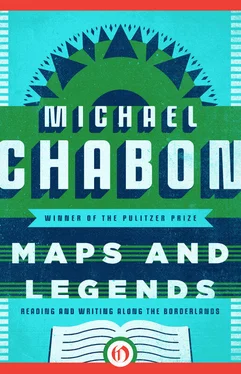Michael Chabon - Maps and Legends - Reading and Writing Along the Borderlands
Здесь есть возможность читать онлайн «Michael Chabon - Maps and Legends - Reading and Writing Along the Borderlands» — ознакомительный отрывок электронной книги совершенно бесплатно, а после прочтения отрывка купить полную версию. В некоторых случаях можно слушать аудио, скачать через торрент в формате fb2 и присутствует краткое содержание. Год выпуска: 2011, Издательство: Open Road Media, Жанр: Критика, Публицистика, на английском языке. Описание произведения, (предисловие) а так же отзывы посетителей доступны на портале библиотеки ЛибКат.
- Название:Maps and Legends: Reading and Writing Along the Borderlands
- Автор:
- Издательство:Open Road Media
- Жанр:
- Год:2011
- ISBN:нет данных
- Рейтинг книги:5 / 5. Голосов: 1
-
Избранное:Добавить в избранное
- Отзывы:
-
Ваша оценка:
- 100
- 1
- 2
- 3
- 4
- 5
Maps and Legends: Reading and Writing Along the Borderlands: краткое содержание, описание и аннотация
Предлагаем к чтению аннотацию, описание, краткое содержание или предисловие (зависит от того, что написал сам автор книги «Maps and Legends: Reading and Writing Along the Borderlands»). Если вы не нашли необходимую информацию о книге — напишите в комментариях, мы постараемся отыскать её.
Maps and Legends: Reading and Writing Along the Borderlands — читать онлайн ознакомительный отрывок
Ниже представлен текст книги, разбитый по страницам. Система сохранения места последней прочитанной страницы, позволяет с удобством читать онлайн бесплатно книгу «Maps and Legends: Reading and Writing Along the Borderlands», без необходимости каждый раз заново искать на чём Вы остановились. Поставьте закладку, и сможете в любой момент перейти на страницу, на которой закончили чтение.
Интервал:
Закладка:
Evil, in Lovecraft, is universal, pervasive, and at least partially explicable in terms of notions such as Elder Races and blind idiot gods slobbering at the heart of creation. In James, Evil tends to have more of a local feel, somehow, assembling itself at times, out of the most homely materials; and yet it remains, in the end, beyond any human explanation whatsoever. Evil is strangely rationalized in Lovecraft, irresistible but systematic; it can be sought, and found. In James it irrupts, is chanced upon, brushes against our lives irrevocably, often when we are looking in the other direction. But the chief difference between Lovecraft and James is one of temperament. Lovecraft, apart from a few spasmodic periods, including one in which he briefly married a Brooklyn Jew named Sonia Greene and formed a part of her salon, appears to have liked his own company best. He could be gloomy and testy, and was perhaps most appreciated by his friends at a distance, through his lively correspondence with them. M. R. James, on the other hand, was legendary for his conviviality, and loved nothing more than whiling away an afternoon over sherry and tobacco with his erudite friends. Indeed, friends — colleagues, companions — play an important role in James’s stories, coming along to shore up the protagonist’s courage at just the right moment, providing him with moral support, crucial information, or simply another soul with whom to share an unspeakable secret. In Lovecraft the protagonist has often cut himself off from his friends and companions, and must face the final moment of slithering truth alone.
Lovecraft wrote, in part, for money, often as little as one and a half cents a word; James was an avowed hobbyist of literature, and wrote many of his finest stories as Christmas entertainments of the sort already described, reading them aloud to his assembled friends by the light of a single candle. The stories are, nevertheless, unmistakably works of art, the products of a peculiar imagination, a moral sense at once keen and undogmatic, and an artist’s scientific eye for shape and structure.
This brings us back to “Oh, Whistle, and I’ll Come to You, My Lad,” whose unlucky protagonist, Parkins, we first encounter in conversation with his fellow professors over dinner “in the hospitable hall of St. James’s College.” (James’s stories never originate in cheap atmospherics, fogs or plagues or blasted landscapes, or with the creaky, dubious avowals of narratorial sanity so beloved of Lovecraft and Poe.) In the very first sentence* James displays the remarkable command that qualifies him as a great unrecognized master of point of view, which is the ultimate subject of any ghost story and, of course, of twentieth-century literature itself. For the narrator, or the author, or some indeterminate, playful amalgam of the two, reveals himself before we are twenty words into the story, and will continue to remind us of his presence throughout, right up to the final paragraph, when at last he takes leave, with a strange kind of cheerful pity, of the shattered Professor Parkins.
I don’t think any writer has handled a narrator in quite the same way as James in “Oh, Whistle.” For the narrator here is not merely a disembodied authorial voice in the classic nineteenth-century manner. He is involved in the lives of the characters he describes, he knows them, he sees them on a regular basis — he is, albeit invisibly, a character in the story, cut from the same cloth, as it were, as Professors Parkins and Rogers and the rest of the St. James faculty. There are portions of the story, he suggests, that could be told, that actually happened — most of them having to do with the game of golf — but which he gratefully lacks the expertise to set down. This accords with a fundamental operation of the supernatural story, from “The Facts in the Case of M. Valdemar” to The Blair Witch Project, which is to make the explicit point — generally implicit or finessed in “literary” fiction — that what is being given is a factual account. All ghost stories are “true” stories. We love them, if we love them, from the depth and antiquity of our willingness to believe them.
M. R. James, more than any other writer, explores the wobble, the shimmer of uncertainty that results when quotation marks are placed around the word “true.” Because at the same time that the narrator of “Oh, Whistle” is implicating himself in his story — scrupulously telling us what he has seen for himself and what parts of the story he has only heard second- or third-hand — his supremely “authoritative” voice and evident easy control over the materials establish him as unmistakably the writer of the story, its inventor, hurrying us past characters we need not overly attend to, rendering the events with an impossible familiarity. This, in turn, calls into question the fictional status of the narrator, and hence that of the author himself.
All of this, I know, sounds dubiously postmodern. And indeed James, not merely in his approach, at once careful and cavalier, to point of view, but also in fitting out his stories with the full apparatus of scholarly research (footnotes, learned quotations from Latin, references to obscure medieval tracts), often anticipates Borges and the postmodernists — and with every iota of their self-conscious playfulness. But the playfulness is worn so lightly, and the experiments in point of view are undertaken with such a practical purpose — scaring you — in mind, that even a critical reader may scarcely be aware of them the first time through. James is like some casual, gentleman tinkerer yoking a homemade antigravity drive to the derailleurs of his bicycle because he is tired of being late to church every Sunday.
“Oh, Whistle, and I’ll Come to You, My Lad” is, in many ways, the prototypical M. R. James story. It presents a man who stumbles, through benevolent motives, upon a historical puzzle that cannot fail to interest him and, poking innocently around in it, inadvertently summons — more literally here than in other stories — an unexpected revenant of a bygone time, with frightful results. Professor Parkins—“rather hen-like, perhaps, in his little ways; totally destitute, alas! of the sense of humour, but at the same time dauntless and sincere in his convictions, and a man deserving of the greatest respect”—kindly agrees to take time away from his golfing vacation on the Suffolk coast in order to investigate the ruins, in the neighborhood where he plans to stay, of an old Knights Templar church in which one of his colleagues takes a scholarly interest. Parkins, we have seen, is an avowed skeptic when it comes to the supernatural — to a fault, perhaps. Digging with his pocketknife in the earth around the ruins, he uncovers a strange metal flute bearing an enigmatic Latin inscription. When — as inevitably he must — Parkins plays a few notes on the flute, he calls up a series of increasingly terrifying disturbances, both atmospheric and psychic: winds, night terrors, and puzzling disarrangements or disturbances of the second, supposedly empty bed in his room at the Globe Inn. These disturbances culminate in the awful apparition — a marvel of James’s gift for creating horror through understatement and suggestion — of a thing, some thing, with a woeful face of crumpled bed linens.
For this story is also prototypical James in that when at last we encounter the Horror, there is something about its manifestation, its physical attributes, its habits, that puts the reader in mind, however reluctantly, of sex. I say reluctantly in part because the cool, fleshy, pink, protruberant, furred, toothed, or mouthed apparitions one finds in M. R. James are so loathsome; and in part because James keeps his stories studiously free — swept clean — not merely of references to sexual behavior but of all the hot-and-heavy metaphor and overt Freudian paraphernalia with which supernatural fiction is so often encumbered. James is a hospitable writer, and one wishes not to offend one’s host. But the fact remains that “Oh, Whistle, and I’ll Come to You, My Lad” is a story about a man pursued into the darkness of a strange bedroom, and all of the terror is ultimately generated by a vision of a horribly disordered bed. The bodily horror, the uncanny, even repulsive nature of sex — a favorite theme of the genre from Stoker to Cronenberg — is a recurring element in the stories of M. R. James, rendered all the more potent because it feels so genuinely unconscious. Sex was undoubtedly the last thing on the mind of M. R. James as he sat down to compose his Christmas creepers, but it is often the first thing to emerge when the stays of reality are loosened.
Читать дальшеИнтервал:
Закладка:
Похожие книги на «Maps and Legends: Reading and Writing Along the Borderlands»
Представляем Вашему вниманию похожие книги на «Maps and Legends: Reading and Writing Along the Borderlands» списком для выбора. Мы отобрали схожую по названию и смыслу литературу в надежде предоставить читателям больше вариантов отыскать новые, интересные, ещё непрочитанные произведения.
Обсуждение, отзывы о книге «Maps and Legends: Reading and Writing Along the Borderlands» и просто собственные мнения читателей. Оставьте ваши комментарии, напишите, что Вы думаете о произведении, его смысле или главных героях. Укажите что конкретно понравилось, а что нет, и почему Вы так считаете.












